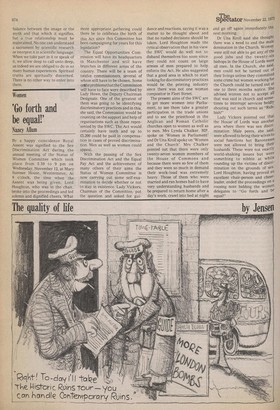Women
'Go forth and be equal!'
Nancy Allum
By a happy coincidence Royal Assent was signified to the Sex Discrimination Act during the annual meeting of the Status of Women Committee which took place from 5.30 to 9 pm on Wednesday, November 12, at Mary Sumner House, Westminster, At 8 o'clock, the time when the Assent was being given, Lord Houghton, who was in the chair, broke into the proceedings and led solemn and dignified cheers. What more appropriate gathering could there be to celebrate the birth of this Act since this Committee has been campaigning for years for this legislation?
The Equal Opportunities Commission will have its headquarters in Manchester and will have branches in different areas of the country. There will be a team of twelve commissioners, several of whom still have to be chosen. Some orthe problems that the Commission will have to face were described by Lady Howe, the Deputy Chairman Designate. One of the greatest of them was going to be identifying discriminatory practices and in this, she said, the Commission would be counting on the support and help of organisations such as those repre'sented by the SWC. The Act would, certainly have teeth and up to. 65,200 could be paid in compensation in cases of proved discrimination. Men as well as women could appeal.
With the passing of the Sex Discrimination Act and the Equal Pay Act and the achievement of many others of their aims the Status of Women Committee is now carrying out some self-examination to decide whether or not to stay in existence. Lady Vickers, Chairman of the Committee, put the question and asked for gui
dance and reactions, saying it was a matter to be thought about and that no rushed decisions should be taken. Lord Houghton made the cynical observation that in his view the SWC would do well not to disband themselves too soon since they could not count on large armies of men prepared to help enforce the Act. He also suggested that a good area in which to start looking for discriminatory practices would be the printing industry since there was not one woman compositor in Fleet Street.
The present aims of the SWC are to get more women into Parliament, to see them take a greater participation. in the trade unions and to see the priesthood in the Anglican and Roman Catholic churches open to women as well as to men. Mrs Lynda Chalker, MP, spoke on 'Women in Parliament' and Dr Una Kroll spoke on 'Women and the Church'. Mrs Chalker pointed out that there were only twenty-seven women members of the House of Commons and because there were so few of them and they were so much in demand their work-load was extremely heavy. Those of them who were married and ran homes had to have very understanding husbands and be prepared to return home after a day's work, crawl into bed at night
and go off again immediately the next morning.
Dr Una Kroll said she thought there was a need to end the male domination in the Church. Women were still not able to get any of the good jobs and the twenty-six bishops in the House of Lords were all men. In the Church, she said, men could not be turned out of their livings unless they committed some crime but women working for the Church could be turned out at one to three months notice. She advised women not to accept all that was said in church and sometimes to interrupt services boldly shouting out such terms as "Rub-fl Lady Vickers pointed out that the House' of Lords was another area where there was sex discrimination. Male peers, she said, were allowed to bring their wives to social functions but Baronesses were not allowed to bring their husbands. These were not exactly world-shaking issues but were something to nibble at while rounding up the victims of discrimination on the grounds of sex. Lord Houghton, having proved an excellent chair-person and cheerleader, ended the proceedings on a rousing note bidding the women delegates to "Go forth and be equal!"
































 Previous page
Previous page